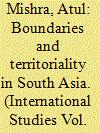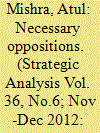|
|
|
Sort Order |
|
|
|
Items / Page
|
|
|
|
|
|
|
| Srl | Item |
| 1 |
ID:
088766


|
|
|
| 2 |
ID:
135152


|
|
|
|
|
| Summary/Abstract |
Emphasis on democracy in Indian and international perspectives on India’s foreign policy has grown over the past decade. Claiming that India is a ‘successful’ example of a non-Western liberal democracy, these perspectives prescribe a role for India in international democratisation efforts. The keener among these suggests that India must participate in Western-style, or Western initiatives of, democracy promotion. This article offers a critique of these prescriptions. Recent theorisations of India’s democratic practices argue that India is a predominantly non-liberal democracy. Drawing upon these theorisations, this article outlines the non-liberal features inherent in the practices of Indian democracy. It also outlines the democratic processes that restrain India’s foreign policy from acquiring an other-regarding orientation. Contesting the characterisations of India as a liberal democracy, this article questions the basis on which the calls for India to participate in liberal democracy promotion projects are made.
|
|
|
|
|
|
|
|
|
|
|
|
|
|
|
|
| 3 |
ID:
188242


|
|
|
|
|
| Summary/Abstract |
This paper reads V.D. Savarkar’s last work, Six Glorious Epochs of Indian History, and advances two arguments concerning Hindutva international thought. Firstly, it foregrounds and theorizes an organicist conception of the international that is embedded in the text. Savarkar’s narrative contains a social evolutionary account of India’s historical international relations. Drawing upon a history of over two thousand years of warfare, they are extremely violent, visceral and mediated by caste and race. These aspects have not been adequately discussed within existing expositions, which emphasize culture and geopolitics. Secondly, the paper examines the Savarkarite framing of the “Akhand Bharat” problematic and the strategy for its resolution. Savarkar situates this post-partition problematic within a long and glorious record of the Hindus in successfully resisting their homeland’s internationalization. The resolution – the establishment of a subcontinental polity of the Hindus – gains within Savarkarite thought the legitimacy and force of a millenialist, affectively-charged history.
|
|
|
|
|
|
|
|
|
|
|
|
|
|
|
|
| 4 |
ID:
115891


|
|
|
|
|
| Publication |
2012.
|
| Summary/Abstract |
For the longest part of the two decades since the end of the Cold War, there were mostly Indian perspectives, rather than debates, on Iran and bilateral relations. Domestic debates on Iran began in 2005 and continued until mid-2008, reaching a crescendo during this period and dissipating soon after. The debates, when they took place, were not about influencing the government's Iran policy. Rather they were the necessary oppositions that emerged from specificities of India's domestic politics in which coalition compulsions, parliamentary democracy and ideological differences played their part.
|
|
|
|
|
|
|
|
|
|
|
|
|
|
|
|
| 5 |
ID:
191736


|
|
|
|
|
| Summary/Abstract |
Examining India's official thinking on international order over the past quarter-century, this article maps the shift in the country's preference from liberal internationalism to the rules-based international order (RIO). It argues that despite Delhi's current narrative of a ‘New India’, the country's order conception shows continuity in being essentially reformist and mostly consistent with the pillars of the 1945 order. While its marked unease with liberalism is a consequence of the changes afoot in India's domestic politics, this development is consistent with, and contributes to, the decline of liberalism as a global force. The current Indian preference for economic protectionism also reflects the larger trend of economic deglobalization. The description of India as a resurgent civilizational state rather than a liberal democracy, while discursively arresting, does not indicate a divergence with the West on the grand strategic question of order-building. Upon reconstructing the Indian iteration of the RIO, the article finds it to be geographical—focused on Asia and the Indo-Pacific—rather than universal. Finally, it posits that India's persisting problem of inadequate power and its risk-averse responses to great power revisionism are likely to undermine its efforts to effectively partner with democracies to shape the emergent RIO.
|
|
|
|
|
|
|
|
|
|
|
|
|
|
|
|
|
|
|
|
|